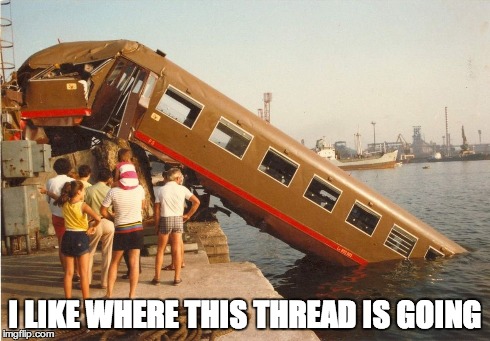I would join this thread ....
but I know where it is going.
I guess that it makes it the most aptly named thread ever!
but I know where it is going.
I guess that it makes it the most aptly named thread ever!
I would join this thread ....
but I know where it is going.
I guess that it makes it the most aptly named thread ever!

I disagree. A lot of that work can be offloaded to the dice. Make a lot of robust random tables, and you don’t necessarily have to do the work of preparing a bunch of encounters, for example. You can also do rolling prep - yes, a good sandbox requires more prepared content than the players will actually see. But you don’t have to prepare more than enough content for a campaign. You only need to prepare more than enough content for the next session. And, the content that goes unused in the next session can often be repurposed to be possible content in the session after that, etc.Sandboxing is really hard and requires tremendous effort on the part of the GM. It's basically only possible if you are spending as much effort on the game as a full time job, which is why I haven't been in one since college and have never really tried to run one.
I could be mistaken, but I think it’s a Forge term. One of many they came up with for various solutions to what Ron Edwards called “the Impossible Thing Before Breakfast” - the inherently self-contradictory notion we nonetheless take for granted about RPGs, that the GM has complete control over the story, and the players have complete control over their characters, who are the main characters of the story.interesting, not a term i believe i've come across before.
I tend to agree. I understand the concept of the pure sandbox, but my experience is that few players actually want to play that way. It's a Platonic ideal, not a realistic one.Railroading >>>no-roading
Had a game where we spent all our time searching for quests and things to do. No over-arching anything. I bet 90% of combats were random encounters while trying to long rest while traveling trying to find a town where something might be happening.
It depends how you’re defining a “true sandbox.” Does the existence of adventure hooks or other signposts pointing out where to go to find interesting and challenging things to do disqualify something as a “true sandbox?” If so, yeah, most players probably won’t like that. But, in my experience players do like having multiple leads to follow or avenues to explore at any given time. One might argue that this is more of a branching structure than a “true sandbox”, but I think in such a model that a “true sandbox”I tend to agree. I understand the concept of the pure sandbox, but my experience is that few players actually want to play that way. It's a Platonic ideal, not a realistic one.
That said, everyone pretty much knows what railroading is. A few ornery voices online misusing the term doesn't mean that the term is useless, just that it's hard to have substantive conversations with people online because all it takes is one dysfunctional personality to derail a discussion.
No pun intended.
I think you may be reading more into my comment than was there. I didn’t claim styles were chosen “arbitrarily,” or that GM authority is only about ego. What I said was that early RPG texts and discourse did codify a GM-centric model, and that framing has had lasting influence on how we still talk about agency and “railroading.” Whether that authority was exercised as adversarial control, as a gracious host, or as secret-keeper isn’t the issue—it’s that the structure itself was assumed and reinforced.
Even if the referee is the most graceful and masterful at hiding the rails, they are still present. And that is the problem. That the rails exist is what makes it railroading.
